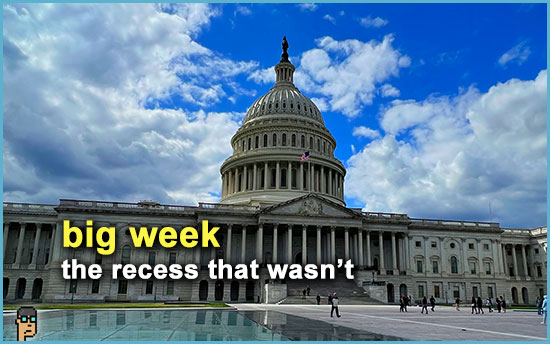Speaker morass
With the Speaker role in limbo in the House (and an election(s) starting Wednesday says Roll Call), so too are the prospects for digital assets legislation.
From a pro-crypto perspective, a near-term slowdown with legislation in the United States may not be critical. “Macro” events such as approval of Bitcoin spot market ETFs could continue to drive retail and institutional interest. Favorable decisions in court cases (Coinbase, Ripple, etc.) could continue to push digital assets into the mainstream. And longer term, there are international efforts which could ultimately be seen as a threat to the U.S. dollar, its primacy and, therefore, national security – always a galvanizing force for Congress.
Meanwhile, anti-crypto advocates likely see a swing further right by Republicans with the House Speaker role as inhibiting the current digital assets agenda led by a House Republican leadership which has sought to build bipartisan momentum essential to law-making success in a divided government.
The House drama isn’t helping Democratic crypto advocates such as Senator Kirsten Gillibrand (D, NY) either. The Senator has openly expressed hope in growing her caucus’ interest in crypto legislation and remains a co-sponsor of the sole, comprehensive market structure bill in the Senate [S.2281] along with Senator Cynthia Lummis (R, WY).
Digital assets law will likely come in a negotiation between the House and Senate (especially stablecoins [H.R. 4766]), but not if the House becomes sidelined by politics and House Republicans render themselves impotent.
Overall, Republicans understand that the Speaker drama has been bad for business. Read one example on that topic from House Financial Services committee member Rep. Mike Flood (R, NE) in speaking to local media.
more tips:
Temporary Speaker Patrick McHenry Steers House on the Fly – The Wall Street Journal
token treasuries
Swiss-based Backed Finance is now offering tokenized, short-term U.S. Treasuries through crypto exchange Coinbase’s Base blockchain. Read more from the company. “The issuance marks the first real-world asset (RWA) token issued on the Base network,” says CoinDesk which adds that the new tokenized assets are not available to U.S. investors. Read more.
name and shame
According to Bloomberg, the UK’s version of the Securities and Exchange Commission (SEC) – the Financial Conduct Authority (FCA) – will start to “name and shame crypto firms” that advertise or tout their products beyond current rules. The marketing rules were originally announced back in June.
The FCA’s director of consumer investments, Lucy Castledine, tells Bloomberg that “the watchdog will start updating its online warning list of violators hourly as new infractions come to light.” Read more.
more tips:
Social media: a golden goose for scammers (Friday) – Federal Trade Commission
Bitcoin as hedge
Among the arguments by advocates on “Why Bitcoin?” has been the cryptocurrency’s limited supply and therefore its usefulness as an inflation hedge. The Wall Street Journal asked two “experts” with opposing views to explain further.
Grayscale Investment’s Zach Pandl is supportive of the hedge idea and said the scarcity of Bitcoin is “guaranteed” whereas other assets – such as gold – is not. Pandl adds, “While estimates exist, the absolute amount of gold that will ever exist is unknown.”
Cornell University Eswar Prasad doesn’t agree and sees volatility and inefficiency, in particular: “The blockchain system can’t handle a lot of bitcoin transactions at once.” Read more.
survey says
A new global survey inds that reasons people are using crypto are as varied as the countries they come from. “In Turkey and the US, around 27% of female investors tend to utilize crypto investments to fund their children’s education. In contrast, the percentages for South Korea and Japan in this regard are notably lower, standing at 5% and 4%, respectively,” reads a press release. Read more.
The survey was conducted by Bitget, a cryptocurrency exchange in the Seychelles.
use case – nuclear
Standard Power, which has been partnering with nuclear energy facilities to power data centers and Bitcoin mining operations announced a new deal with technology provider NuScale Power Corporation and energy developer Entra1 Energy. According to a release, the companies will “develop two facilities backed by nearly 2GW of energy from 24 small modular [nuclear] reactors.” The facilities will be located in Ohio and Pennsylvania and serve to power two data centers. Read more.
Standard Power CEO Maxim Serezhin provided context on the deal: “We see a lot of legacy baseload grid capacity going offline with a lack of new sustainable baseload generation options on the market especially as power demand for artificial intelligence computing and data centers is growing. We look forward to working with Entra1 and NuScale to deploy NuScale’s proven SMR technology to deliver carbon-free, baseload energy to address this large gap in the generation market.”
According to LinkedIn, Standard Power has 30 employees today.
Computing intensive operations will continue to grow and Bitcoin mining operations have arguably been at the forefront of understanding this future.
FTX trial stuff
‘A Galactic Embarrassment’: The Crypto World Is Already Sick of SBF’s Trial – Wired
Opinion: The SBF trial is a reminder that crypto is a rotten business – Financial Times
Sam Bankman-Fried directed financial crimes and lied about it, FTX co-founder testifies – CBS News
still more tips
Bored Ape Yacht Club NFT Creator Yuga Labs Confirms Layoffs – Decrypt
What is finality in blockchain, and why does it matter? – Cointelegraph

